Rechercher
Affichage de 1935 à 1950 sur 3123 actualités
-

Amuddu échange avec ses partenaires sur les pratiques de mentorat comme levier d’intégration socio-économique des personnes migrantes et réfugiées
Clara HUYGHE | 24/06/2021
À l’occasion de la célébration de la Journée Mondiale des Réfugiés, le projet Amuddu a organisé un atelier d’échange le 24 juin 2021 à Rabat sous le thème du « Mentorat un levier pour l’intégration socio-économique des personnes migrantes et réfugiées ».Cet évènement fut l’occasion de faire la restitution de l’étude sur la pratique mentorale en faveur des personnes migrantes et réfugiées, menée dans le cadre de la mise en œuvre du projet Amuddu en partenariat avec le Ministère Délégué Chargé des MRE et des Affaires de la Migration (MDCMRE) et l’ANAPEC. Un manuel a été conçu sur base de cette étude sur le potentiel du mentorat comme levier d’intégration socio-économique des personnes migrantes ainsi que deux fiches pratiques « Je deviens mentor » et « J’adopte le mentorat au sein de mon entreprise ». Ce manuel est un outil de référence pour les partenaires désireux d’expérimenter l’approche du mentorat à destination des personnes migrantes et réfugiées.Les membres du Comité programme formation professionnelle et emploi (CP3), organe institué par la Stratégie Nationale d’Immigration et d’Asile (SNIA), ainsi que d’autres acteurs impliqués dans l’insertion professionnelle des personnes migrantes et réfugiées au Maroc et en Belgique tel que Le Forem, ont pris part à cette restitution. Une réflexion a également été menée autour de l’intérêt d’implémenter une telle approche dans les institutions publiques marocaines et les organisations de la société civile (OSC) qui cherchent à faciliter l’intégration économique des personnes migrantes et réfugiées. Il a aussi été question de partager quelques expériences pratiques exécutées ou en cours d’exécution. Enfin, cet atelier fut l’occasion de débattre et d’échanger sur le mentorat et de permettre ainsi l’ouverture de l’expérimentation de cette pratique dans l’intégration économique des personnes réfugiées et migrantes au Maroc. La journée Mondiale des Réfugiés est organisée par l’Agence des Nations unies pour les Réfugiés (UNHCR) conjointement avec le Ministère délégué auprès du Ministère des Affaires Etrangères et de la Coopération Africaine et des Marocains Résidents à l’Etranger, Chargé des Marocains Résidents à l’Etranger avec l’appui et le soutien d’Enabel.
-

VET Toolbox New Service Launch. Digital event, 08.06.2021 - VIDEO
Maarten DE RUYCK | 22/06/2021
Investment not only needs finance but also people with the right skills. The new VET Toolbox service supports - in close collaboration with other stakeholders - local people in 11 countries in Sub-Saharan African in acquiring those skills. Dialogue between the public and private sector will be at the basis of targeted actions in specific sectors or value chains.On 8th June 2021, VET Toolbox presented this new service during an online launch event attended by around 200 participants. Rewatch the videos that were presented during the launch event and/or download the powerpoint presentation and relevant documents via https://www.vettoolbox.eu/en/news/new-vet-toolbox-service-increase-local-benefits-european-investmen...
-
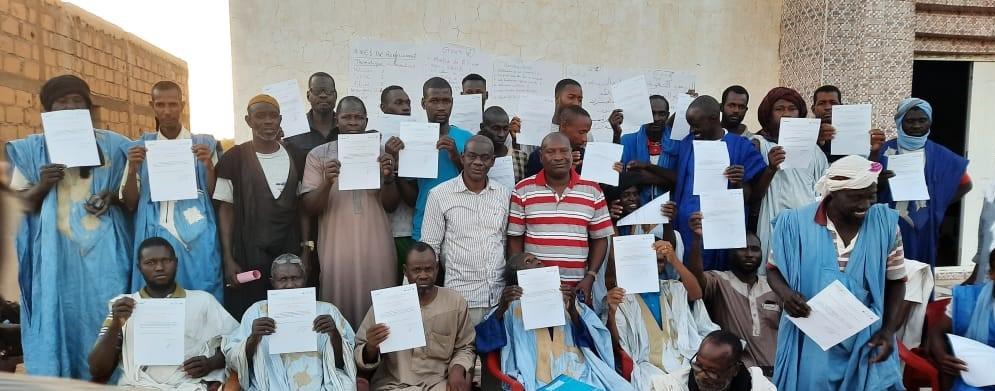
Enabel renforce les capacités des agro-pasteurs en Mauritanie
Aminata KANE | 21/06/2021
Remise des attestations de formation des facilitateurs des Champs Ecoles Agropastoral (CEAP) La finalité de cette formation est d’accompagner des acteurs de la filière des décrues tant en termes de structuration que d’acquisition de compétences organisationnelles ou techniques par la formation des facilitateurs autour d’un Champ Ecole Agro-Pastoral (CEAP). La sélection des facilitateurs (conseiller paysan) est faite dans les pôles de production de chaque wilaya (région) en collaboration avec les délégations régionales du ministère d’aménagement rural. L’équipe du projet était accompagné par les techniciens des délégations pour expliquer l’approche CEAP. Les critères de choix d’un facilitateur étaient : • Agriculteur des décrues • Résident dans son village • Motivé et accepté le choix porté sur lui • Représentatif du groupe de producteurs de son site • Capable de lire et écrire • Apte à participer aux formations : avoir au plus 50 ans. • Capable de pratiquer et d’assurer la transmission aux producteurs les techniques innovantes perçues lors des formations Les produits et bienfaits qui sont ressortis de cette activité sont entre autres : • Renforcement des facilitateurs sur les itinéraires techniques des principales culture des décrues • Mise en place du groupe de producteurs (environ 15 à 25 dans chaque site) pour chaque facilitateur • Mise en place d’un CEP (Champ Ecole Paysan) par facilitateur • Structuration des producteurs des décrues de chaque site avec le facilitateur • Mise en place de quelques mutuelles d'entraide des producteurs de certains sites • Appui conseil des producteurs par le facilitateur • Mise en place du maillon facilitateur de la filière des décrues, etc. L´approche Champs-Ecoles Agro-Pastoraux (CEAP) du RIMFIL vise à renforcer les capacités techniques et organisationnelles des agriculteurs et des pasteurs à travers l’amélioration de leurs capacités d´observation, d´analyse et de prise de décision. Les CEAP sont une déclinaison en milieu agro-pastoral des Champs Ecole Paysans (CEP). Ils sont une approche novatrice en Mauritanie de vulgarisation auprès des pasteurs et agro-pasteurs qui se basent sur la pratique et un apprentissage axé sur les problèmes diagnostiqués au sein des systèmes de production agricoles et pastoraux. Les activités d’appui spécifiques aux pasteurs pourront être développés selon leur nature (production laitière, santé animale…) dans un cadre autre que celui du champ-école paysan classique et de la parcelle agricole de productions. Après avoir participé avec succès aux 4 formations sur l’approche Champ Ecole Agropastoral (CEAP) des cultures de décrues et cultures vivrières, les facilitateurs des régions du Hodh El Chargui et Garbi, Guidimakha, Assaba ont reçus des coordinateurs des régions respectives leurs attestations de formations. Un suivi des facilitateurs est planifié même après la fin de la formation.
-
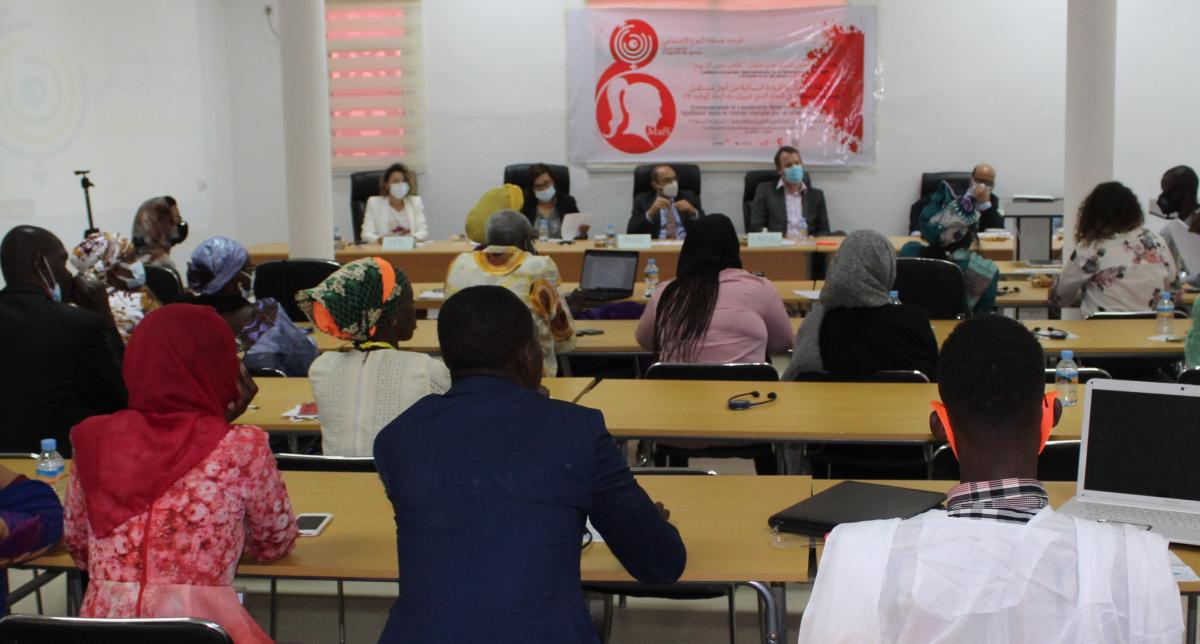
Enabel en Mauritanie soutient l'essor et l'entrepreneuriat des femmes
Aminata KANE | 21/06/2021
Pour la journée internationale des femmes, Enabel Mauritanie célèbre cette année le génie des femmes qui ont su déployer des efforts formidables afin de contrer la crise liée à la pandémie de la COVID-19 et d’escompter un meilleur futur à leur façon. Partout dans le monde, chacun à sa manière fait honneur aux dames, en cette journée mémorable.Pour participer à cette cérémonie, Enabel s’est mise en selle et en partenariat avec l’Observatoire de l’égalité du genre, financée par la Coopération Espagnole. L’Observatoire a pour but d’être un espace ouvert à la recherche, à la créativité et l’innovation. C’est un collectif qui est conçu pour suivre l’évolution du caractère social de la thématique de l’égalité du genre. L’égalité des genres et l’autonomisation des femmes constituent une priorité aussi bien pour Enabel et ses partenaires et ce conformément aux axes de sa stratégie genre #WeforHer et de son Plan d’entreprise 2020.L’évènement s’est déroulé dans la bonne humeur et des échanges fructueux se sont faits entre les étudiants et les partenaires présents. La salle était pleine et tout le monde avait son masque. Les propos sont traduits et les étudiants se répartissent les présentations selon la langue préférée.Le tout a débuté avec l’introduction de la modératrice Mme Houleye KANE et les remerciements de l’observatoire avec Mme Binta SY, assistante technique. Suivi de Rita SANTOS, coordinatrice de l’AECID qui a offert ses félicitations aux femmes et à l’université, mot sur l’avancement de l’égalité dans tous les pays, « mais un travail reste à faire, pas en avant sur le focus de l’égalité, inclure la femme dans l’avancement vers la qualité dans l’entreprenariat», explications de la mission de l’OBEG et motivation pour que les étudiants avancent dans leurs recherches et études pour le développement de la Mauritanie. La présentation s’est poursuivie avec le Doyen Faculté des Sciences Juridiques et Economiques de l'Université et son mot de bienvenue, félicitations pour l’engagement des étudiants et leurs investissements, échange sur thématique sur le genre et leur conscience de leur apport et souhait d’échanges fructueux. Exposition sur chaque groupe thématique de l’OBEG :-Exposé sur la mission, les fonctions et objectif de l’OBEG-Justice, exposé sur les textes juridiques concernant l’égalité du genre-Education, exposé sur éducation féminine en Mauritanie et perspectives d’amélioration-Santé, exposé sur la reproduction, contraception et planning familiale-Médias et Communication, exposé sur taux et présence des femmes dans les médias-Développement durable et entreprenariat féminin, exposé sur femme et emploi, le contexte, l’évolution, convention et illustration. Le panel Enabel a été animé par Mathias LARDINOIS, directeur pays, avec un mot explicatif sur les interventions, l’importance de la stratégie genre dans les activités et la résilience des femmes pendant la pandémie. Il a été suivi par Djeinaba TOURE qui présenta l’entreprenariat féminin avec son histoire, ses faits importants, son lien avec le développement durable et elle a fini avec ses recommandations. Sa présentation a été ponctuée de chiffre illustrant l’évolution des femmes dans le secteur de l’entreprenariat dans le monde.Elle a aussi donné des clarifications sur les caractéristiques des entrepreneuses en les séparant en différents groupes ; selon leur environnement positif ou négatif, les éléments déclencheurs de leur aventure dans l’entrepreneuriat et explication sur le plafond de fer qui freine et limite les femmes dans leur processus entrepreneurial. Un exposé brillant et plein d’informations pour mieux comprendre le pourquoi et le comment de l’expérience des femmes dans l’entrepreneuriat. Les panels suivants portaient sur l’éducation avec l’AFD, présentation historique de l’entrepreneuriat avec l’UE, l’ANAPEJ service public de l’emploi et sa mise en place de leur cellule genre et le dernier panel était l’ONG ACTIONS avec un plongeon dans l’économie sociale et solidaire.Pour finir, on peut dire que l’évènement fut un succès avec des échanges dynamiques et que les résultats attendus ont été atteints, apportés aux étudiants :Une idée sur l’environnement de l’entrepreneuriat en Mauritanie en général et pour les femmes en particulierActions en cours dans le cadre des stratégies en vigueur et interventions du secteur privé pour encourager les femmesAppel à la mobilisation des jeunes et des femmes vers l’autonomisation ; meilleure insertion dans le tissu économiqueGrâce aux discussions, partages de connaissances et d’expériences nous avons sûrement insuffler de la détermination et de la motivation aux jeunes étudiants. Cet évènement s’est terminé avec une ouverture pour les opportunités à venir et une mise en relation entre les groupes thématiques de l’observatoire et nos interventions.
-
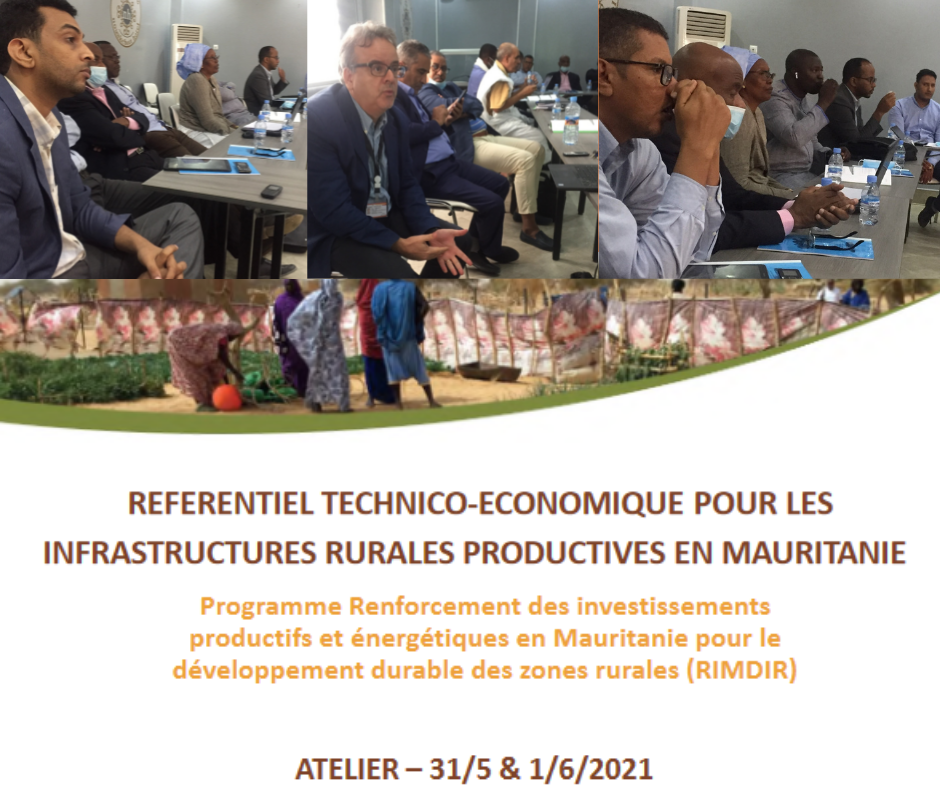
Enabel contribue au renforcement de l'accès aux services et infrastructures productives en Mauritanie
Aminata KANE | 21/06/2021
Atelier: Référentiel technico-économique pour les infrastructures rurales productives en MauritanieLors d’un atelier de deux jours du 31 Mai au 1 juin à Nouakchott, Enabel, les équipes techniques des ministères concernés et le bureau d’étude belge SHER ingénierie/conseils ont eu des échanges constructifs sur la mise en œuvre d’une capitalisation technique qui permettra aux services techniques du Ministères d'Aménagement Rural de se doter d’un référentiel technico-économique pour les infrastructures rurales productives. Au niveau des infrastructures rurales, les problèmes rencontrés sont : le mauvais choix d’emplacement ; ouvrage jamais utilisé et jamais réparé vu sa non utilité pour les usagersla mauvaise qualité de l’ouvrage ; ouvrage dégradé et réparé par les usagers eux-mêmesL’ouvrage doit correspondre à une utilité technique et économique afin d’assurer sa pérennité. Le problème est attaqué de plusieurs cotés; technique, légale et le transfert de gestion de l’ouvrage à des organisations locales d’usagers. Pour atteindre une capitalisation technique efficiente et durable, SHER un bureau d’étude belge a été mobilisé. Un travail continu et fluide avec les ministères a été établi via une collecte de données et d’expériences. Le tout ensuite élargi au niveau des ONG et programmes/projets. Les structures rencontrées sont de trois types; ministères, ONG, programmes et projets et comme on peut le voir est très large:Ministère du Développement Rural (MDR)Ministère de l'Hydraulique et de l'Assainissement (MHA)Ministère de l'Environnement et du Développement Durable (MEDD)Programmes EU (Programme RIMDIR, Programme RIMRAP, Programme RIMFIL)OSP et ONG (Groupement National des Associations Pastorales, Groupement de Recherche et de Réalisation pour le Développement Rural, GRET, Tenmya, Atica - Agrisahel)Projets (Projet Régional d'Appui au Pastoralisme au Sahel, Projet Promotion Développement des Oasis, Projet de Développement de la Résilience à l'Insécurité Alimentaire et Nutritionnelle au Sahel en Mauritanie, Projet de Développement des Filières Inclusives, Projet Régional d'Appui à l'Initiative pour l'Irrigation au Sahel, Projet de lutte contre la pauvreté dans l'Aftout Sud et le Karakoro-Phase II, Projet de renforcement de la Résilience à l'insécurité alimentaire et nutritionnelle au Sahel, Projet National Intégré dans le Secteur de l'Eau en Milieu Rural)L'élaboration du référentiel technico-économique suit un cheminement en quatre étapes:1/ Définition des besoins de la DAR (Direction Aménagement Rural), DFAPP (Direction de Développement des Filières Animales et Pastorales) et cadrage des prestationsEtablissement d’une liste des ouvrages retenus dans le cadre du référentiel Structuration en thématique, fiches et annexes techniques selon 3 dimensions ; technique, sociale et économiqueIntégration de l’approche ingénierie sociale pour éviter les conflits (socio-foncier, socio-économique)2/ Elaboration de 13 fiches et de 4 annexes techniquesCapitalisation d’expérience (rencontres et échanges)Valorisation de l’expérience régionaleRecherche et synthèse bibliographiqueRéflexion sur l’accessibilité à un public d’horizon varié3/ Formation au référentiel et à sa diffusionFormation de "référents-formateurs"4/Elaboration d’un guide d’entretiens des ouvrages Traduction des fiches synthétiques en arabe Intégration des observations et relecture par le RIMDIR Rédaction, impression et diffusionLes fiches sont présentées sous plusieurs thématiques et complétées par des annexes techniques Infrastructures de mobilisation et de stockage d'eau de surface Aménagements hydro-agricolesInfrastructures de désenclavementAménagements antiérosifsAménagements pastorauxAnnexes techniques; pompage solaire, clôtures, chéneaux de transfert et magasins de stockage fraisLes aspects socio-fonciers des fiches de diagnostic sont gérés par le RIMDIR. Une analyse de préfaisabilité de 10 critères est établies, voir si les conditions sont réunis pour les investissements ou non. Différents caractéristiques pour orienter les décisions de l'état, selon la rentabilité. Le but du référentiel technico-économique est d’avoir des documents de bonne qualité sur le sujet des infrastructures rurales. Ensuite de former les services de l’état, les bureaux d’étude et les universités, exemple de l'ISET institut de Rosso en ingénierie rural pour une diffusion efficace des outils. Des fiches d'entretien pour les associations d'usagers et un guide pour les comités villageois sera traduit dans les 4 langues locales. Pour conclure, la finalité est d'assurer l’utilité des ouvrage dans le contexte social et économique. Former les prestataires des ouvrages ici l'état, les bureaux d'étude, ONG pour assurer une meilleure qualité des ouvrages et rentabilité sur long terme.
-

L'Entreprenariat aux oasis - Maroc
Meriem HILALI | 21/06/2021
En partenariat avec la fondation ZERI, l’ensemble des acteurs de la zone oasienne, Enabel au Maroc, le Conseil Régional d'Investissement Drâa-Tafilalet et l’Agence Nationale pour le Développement des Zones Oasiennes et de l'Arganier ont organisé au profit des acteurs de la filière datte deux ateliers dans la région Drâa-Tafilalet au sud du Maroc, le 24 et 25 mai 2021 deux rencontres qui ont été animées par l'expert international, Gunter Pauli sous thèmes « Entreprenariat rural opportunités et perspectives » et « Economie circulaire et économie bleue dans la zone oasienne ».Cette initiative s’inscrit dans le cadre du projet PAGIE « Appui des groupements d'intérêt économique pour le développement de la filière phœnicicole au niveau des oasis marocaines », en relation avec la stratégie agricole Green Generation, pour le renforcement des jeunes promoteurs et l’émergence des innovations vertes dans la zone oasienne, ainsi que de nouvelle génération d’entrepreneurs agricoles dans la filière du palmier dattier.
-
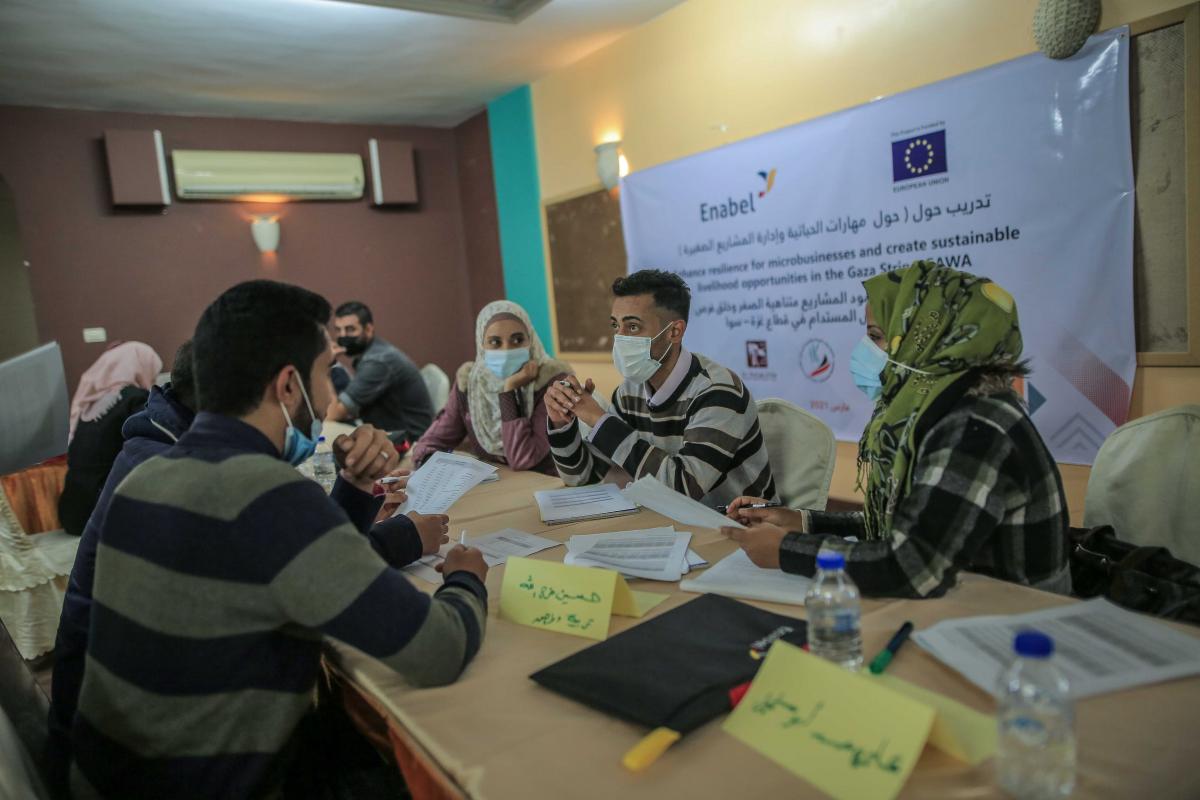
SAWA completed the first phase of the micro-enterprise development training
Roula HANDAL | 14/06/2021
As an essential step before providing the seed fund for SAWA beneficiaries, the implementing partners of SAWA ”WAC and Bayader” have completed SAWA Micro-Enterprise Development” SMED training for the first 48 beneficiaries in Gaza city and Khanyounis.The training improved the beneficiaries’ knowledge, skills, and competencies in the field of business development and life skills. It was designed to cover multi topics in the field of business development such as business planning, financial management, risk management and electronic marketing.The next step is the selection of 20 feasible business plans based on the training to receive a seed fund and create their businesses.Another two training cycles will take place targeting 100 beneficiaries to support additional 80 business plans to have a total of 100 micro businesses established by the SAWA project.
-
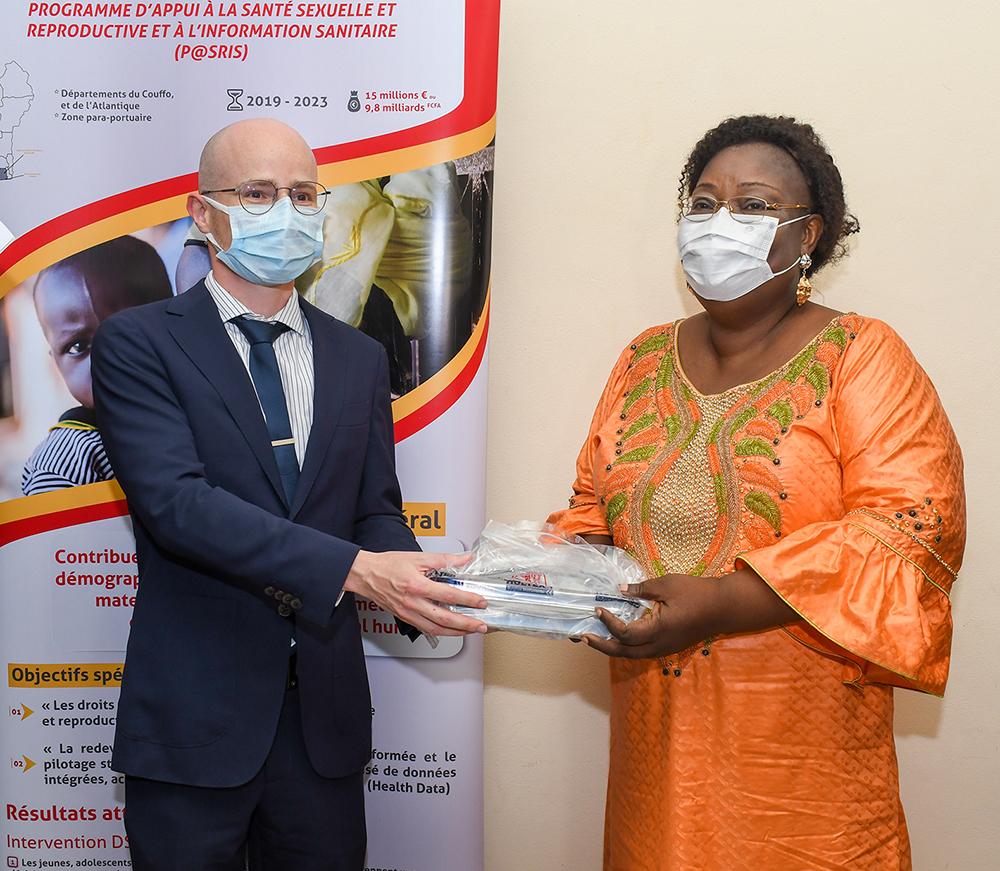
Enabel au Bénin participe à l’amélioration du système d’information sanitaire et la promotion de la recherche en santé
Reece-hermine ADANWENON | 10/06/2021
Au Bénin, la réduction des cas de mortalité maternelle demeure encore un défis. En 2020, 33 femmes dans l’Atlantique et 41 dans le Couffo, sont décédées dans les hôpitaux selon les données de l’annuaire des statistiques sanitaires nationales.Enabel à travers le Projet d’Appui à la santé sexuelle et reproductive et à l’information sanitaire (P@SRIS) s’engage aux côtés du Ministère de la Santé et agit pour un accès universel des populations à des services et soins de santé de meilleure qualité ODD3. C’est dans ce cadre, qu’un important lot de matériels constitué d’équipements médico-techniques, de matériels roulants et informatiques a été remis ce mardi 08 juin 2021 au Ministère de la Santé.D’un coût global de 1 288 225 Euros (844 909 633 FCFA), ces équipements sont destinés à plus de cent-cinquante (150) formations sanitaires publiques et privées et permettront d’appuyer le secteur dans 4 grands domaines :- Santé Sexuelle et Reproductive, - dépistage et la prise en charge des Maladies non transmissibles (MNT), - digitalisation des données- système d’information sanitaire Cet appui s’inscrit en droite ligne des orientations stratégiques 2, 4 et 5 du Programme National de Développement Sanitaire (PNDS) relatives respectivement aux prestations de service et l’amélioration de la qualité des soins, au développement des infrastructures, des équipements et des produits de santé et à l'« Amélioration du système d’information sanitaire et promotion de la recherche en santé ».Ces équipements permettront de :- améliorer les offres de services de Santé sexuelle et reproductive (SSR) avec notamment des équipements pour la prestation des SONU, une vingtaine en motos pour les stratégies avancées dans la communauté et des modèles anatomiques pour la mise en place d’un centre de formation SONU dans l’Atlantique ;- renforcer le dépistage et la prise en charge des maladies non transmissibles liées à la santé sexuelle et reproductive comme l’hypertension et le diabète sur grossesse et les lésions précancéreuses du col de l’utérus ; - assurer la digitalisation des données sanitaires depuis le niveau périphérique avec des ordinateurs portatifs, tablettes, imprimantes et routeurs wifi au profit de relais communautaires, centres de santé , centres hospitaliers, bureaux de zone sanitaire et des gestionnaires de données au niveau départemental et central ; - mettre en œuvre un projet pilote de Système d’Information Hospitalier et de Dossier Electronique du Patient dans une vingtaine de formations sanitaires dans la zone sanitaire Abomey-Calavi-So Ava.Le projet P@SRIS vise l’amélioration de la jouissance des droits des femmes y compris les jeunes filles à travers la promotion de la santé sexuelle et reproductive des adolescent-e-s et jeunes.
-
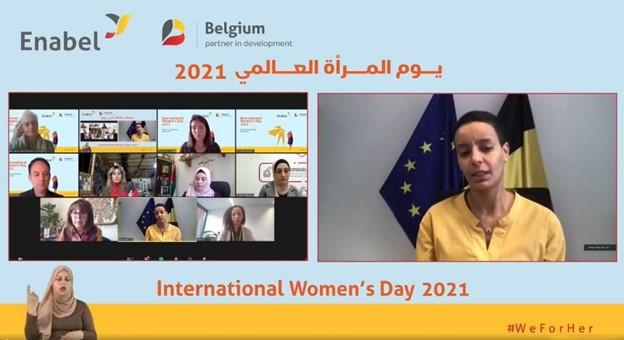
International Women's Day 2021
Roula HANDAL | 10/06/2021
As recently reiterated by our Belgian Minister of Development Cooperation, Meryame Kitir, “Women and girls are drivers of change for development, and they should be encouraged in their leadership aspirations.”Last year has been incredibly difficult for everyone. The COVID-19 pandemic has affected health, economies, labour markets, and worldwide and almost every aspect of our lives. For women, the pandemic has been particularly challenging. Women were at the forefront of the pandemic response. However, despite COVID-19’s massive disruption to all spheres of lives, the pandemic has also shed light on an important opening to rethink women’s roles as role models in their community.Enabel joined the global celebration of International Women's Day with the theme “Women in leadership: Achieving an equal future in a COVID-19 world” and the tremendous efforts by women and girls in shaping a more equal future and recovery from the COVID-19 pandemic. Team Belgium (Enabel Palestine and the Consulate-General of Belgium in Jerusalem) took this opportunity to put inspirational women and their male allies in the spotlight and share their story.Women in Leadership - YouTubeOn March 10th we held a round-table discussion on women leadership and positive masculinities in Palestine. Interested to see how it went?Click here to watch the recording in Arabic.Click here to watch the recording in English.
-
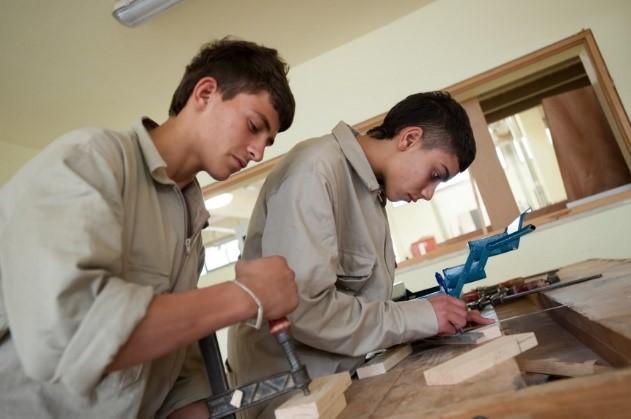
A Skills Development Fund - governance and financing of the TVET system
Roula HANDAL | 10/06/2021
Under the first result of the Skilled Young Palestine (SYP) Project, Skills Development Funds (SDF) will be developed and implemented to contribute to the establishment of an institutional framework for skills development funding and governance in Palestine, whereby the set-up will mirror the future TVET commission. The SDF will serve as a flexible financing mechanism to stimulate bottom-up initiatives and partnerships between training institutions (public or private not-for-profit training providers) and the private sector, as well as social partners, in order to provide flexible, qualitative and demand-driven, i.e. labour market relevant, training and to facilitate the transition from the world of school (training institutions) to the world of work.A coaching trajectory to facilitate the set-up and the implementation of the SDF has started in 2020 and brought all stakeholders around the table to define the roles and responsibilities and set up a mechanism for social dialogue. The results of these round table discussions will result in a hands-on blueprint (with manual) that can be used by interested parties to facilitate the organisation and financing of skills development. The first results of the pilot that is taking place will feed into this manual.
-
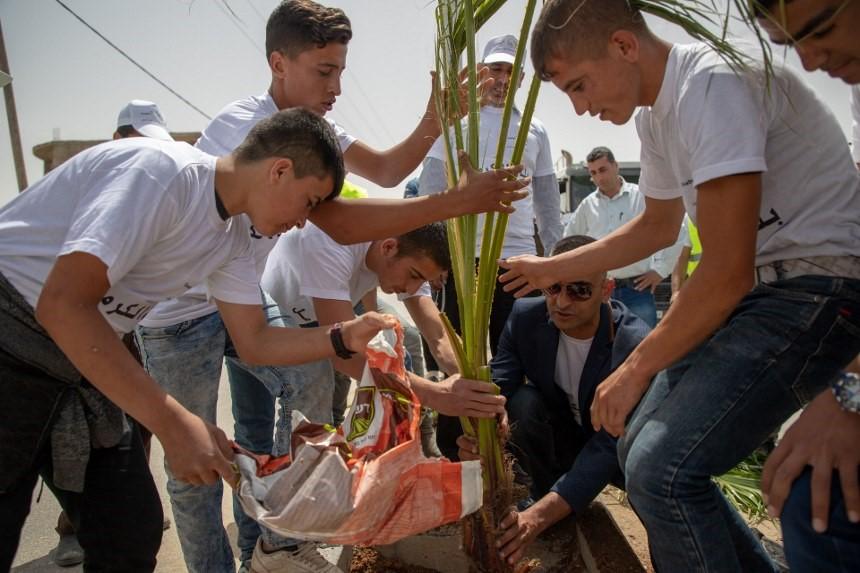
The LGRDP II programme gets a 3 year extension
Roula HANDAL | 10/06/2021
Based on the Palestinian and Belgian cooperation, both parties decided to extend the Local Government Reform and Development Programme (LGRDP II). The programme extension will focus on environment and climate change and contribute to developing more green, resilient and sustainable municipalities and territories.This extension will build on the achievements and the lessons learned of the Belgian cooperation in the Local Government sector (since 2005) and consolidate initial support provided by the Belgian government (2016-2018) to the Environment Quality Authority (EQA) in the elaboration of the Palestinian Authority strategies and plans to address the impacts of climate change.The present extension of the LGRDP II specifies the new strategies, activities and means needed to fulfill the above-mentioned objectives, for a budget of 3 million euros over 3 years – from the beginning of 2021 until December 2023.
-
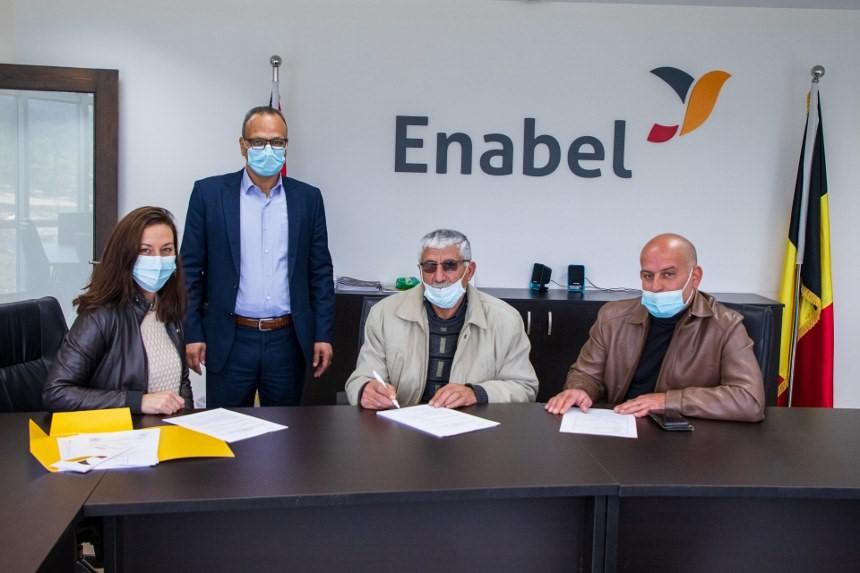
Signing of 23 Grant Agreements for Skilled Young Palestine to implement pilot-SDF
Roula HANDAL | 10/06/2021
By the end of February 2021, Enabel has signed 23 grant agreements to implement short-term training courses via a work-based learning approach. These 23 partnerships were signed with Private Sector Umbrella Organisations (PSUOs), and each partnership comprises of one PSUOs (and their members) and at least one Technical Vocational Training Centers.The projects target over 10 different sectors and will be implemented in 2021 and 2022. They will be receive continuous support from Enabel and the Ministry of Labour throughout the implementation. These 23 projects are the first pilot for the Skills Development Fund (SDF). We are looking forward to the training activities and wish our partner all the best with the start!
-
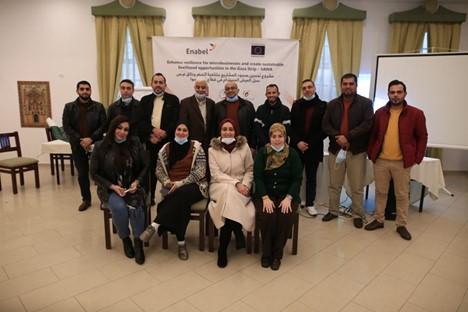
SAWA project completed the first phase of their partners’ capacity of building program
Roula HANDAL | 10/06/2021
As a step forward towards ensuring the sustainability of SAWA project, we have completed the first phase of building the capacity of our partners in the field of community-based micro-business development services and Monitoring, Evaluation, Accountability and Learning (MEAL).SAWA partners were able to update their business development systems, structures, policies, producers, and manuals. They will also provide community-based business development services while applying relevant MEAL system, which can help in measuring the progress and impact of SAWA project on the beneficiaries and community levels.
-
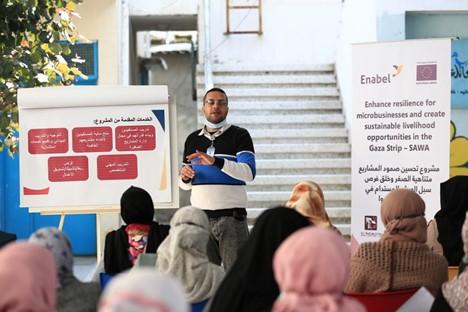
SAWA Project conducted sensitization sessions to outreach women and youth
Roula HANDAL | 10/06/2021
In February, SAWA project and partners (Bayader and Woman's Affairs Centre) have successfully implemented 56 sensitization sessions for women and youth. The first group of sessions were organized in the most vulnerable communities in the Gaza strip. The focus of the session was to encourage the communities to apply for financial and non-financial services in the frame of sustainable livelihood opportunities. More than 1200 women and youth attended the sensitization sessions that were facilitated by SAWA team and implementing partners. SAWA received a total of 24,950 applications.The second group of the sensitization sessions was a preparatory step before conducting the Go-green Hackathon. SAWA team and the Palestinian Federation of Industries (PFI) conducted 8 sessions with universities and technical colleges. The sessions presented and disseminated the key challenges of the green and circular economy within the industrial sector. During the sessions, 300 youth (120 Male, 180 Female) have gained a better understanding of the green challenges, which will serve as a starting point for solution and idea generation to compete in the hackathon. SAWA received a total of 395 applications with ideas to participate in the hackathon. The Go-Green hackathon will take place at the beginning of April. It will be the first Hackathon in Palestine that deals with green and circular economy challenges within the industrial sector.
-
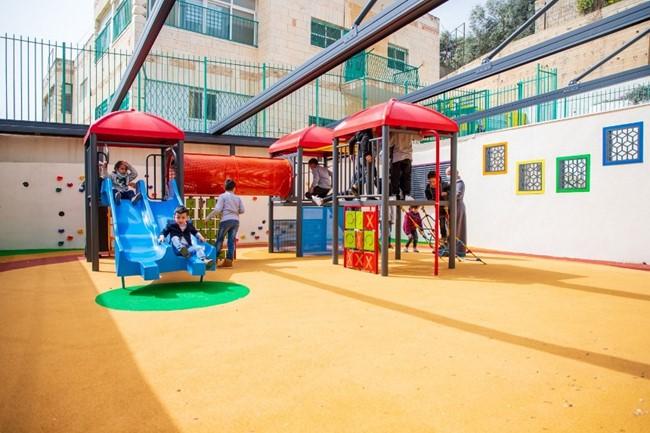
RiSE project finalized rehabilitation works in 3 schools
Roula HANDAL | 10/06/2021
In Al-Hasan Al-Thany school, Wadi Al-Joz, the space for a Fablab with an external working area was created. In this Fablab the students will receive technological, innovative, and creative training where they can further develop their 21st Century skills.In Al-Rawdah Al-Haditha, the only public school located in Zaayem suburb, a school extension was built to create 6 much-needed additional classrooms and a counselor room. Until now, the school was mixed only up to 8th grade and girls-only upwards, leaving teenage boys with no option to complete their education locally and leading to a high school drop-out. The new extension will allow them to complete their curriculum from kindergarten to grade 12 within the same school.In Jabal Al-Mukabber a kindergarten unit was created. With an education in East Jerusalem under constant pressure and ever-increasing threat, offering free early childhood education within Palestinian public schools is a key element to ensure the freedom of choice to follow one’s curriculum and narrative from the start. The whole school, together with 9 extra schools selected for the RiSE project, will be further rehabilitated in 2021.
